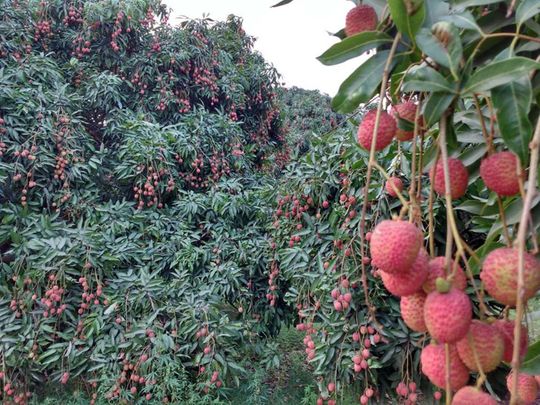
Patna: Debt-ridden farmers in Bihar have begun distress sale of fruit and vegetables grown on their lands as there are very few buyers for the produce. Most of these farmers had taken loans to finance their farming activities. Although they have had a bumper production so far this season, they are unable to transport the produce to the markets in nearby towns or in other states due to suspension of all transport services in view of the lockdown over the coronavirus pandemic. The result is that these hapless farmers are now compelled to sell their produce at throwaway prices lest they rot in the fields in the summer heat.
The worst-hit are the litchi growers. They had faced severe financial losses in recent years due to rumours that consumption of this luscious fruit was the main reason behind the outbreak of encephalitis. They breathed a sigh of relief after health experts quashed the idea in recent months. However, the lockdown over the pandemic has dealt a severe blow to these farmers.
Highest pulp percentage
“We are staring at a huge financial loss this time as 90 per cent of the produce from our gardens still remain unsold. Previously, big traders would visit us right when the flowering season started and by March-end, the produce from most of our gardens would get sold out. This year, no trader from any major city in India or abroad has come and placed orders for our litchi,” said Arvind Kumar Singh, a litchi-grower from Muzaffarpur, famous for the juicy ‘Shahi’ variety of the fruit that is believed to contain the highest pulp percentage.
A Bihar horticulture department report says litchi is grown on more than 32,000 hectares of land in the state and the average annual yield is 300,000 tonnes. Bihar contributes 40 per cent of the total litchi production in India and as many as 45,000 farmers are engaged in the cultivation of this fruit, amply indicating how this cash crop has helped boost the state’s rural economy for decades.
Minimising losses
Litchi-growers said they earned good amount of money by supplying the fruit to various Indian cities and even abroad. However, this time around, they will need to push the product to local markets to try and minimise the loss and also make sure that the trading is done while the fruit is still fresh, since it is highly perishable. “We don’t think we will be able to sell a maximum of more than 25 per cent of our produce in the local markets. The rest will go waste,” Bihar litchi Growers Association president Bachcha Prasad Singh said. According to him, the total market for litchi is worth around Rs10 billion (Dh484.03 million), but this time around, there are no big buyers.
Spectre of suicide
Bachcha Prasad said the main markets for litchi growers used to be Mumbai, Delhi, Bangalore and Ahmedabad. But all these cities are currently in lockdown owing to COVID-19. “People are locked in their homes as transport services remain mostly suspended. Even if we are able to send our produce there, who will move out of their homes and rush to the markets to buy them, risking their lives?” he wondered.
Another farmer, R.B. Shahi, said he was facing severe financial loss due to the prolonged lockdown. They will have no option other than committing suicide if the government doesn’t initiate urgent measures, he said. The fruit gets ready from the third week of May and remains available until the second week of June. The shelf-life of the fruit varies from two to three days, which explains the kind of pressure the farmers are in right now to sell their produce before they are all wasted.
The condition of farmers growing watermelons and muskmelons is no better. Poor farmers are selling their produce at very low prices in local markets as they are unable to transport it to bigger cities owing to the lockdown. “When we don’t have transport facilities to even travel to the adjacent districts and towns, how can we send our produce there? We are in a serious crisis this year,” said Ashok Kumar who has been cultivating watermelons for the past five years following a jobless streak.
Lowest-possible price
He said farmers like him were selling watermelons at a throwaway price of Rs4 a kilo Rs400 a quintal this time, which is the lowest in the past two decades. “During this peak season, we would sell them at Rs20-25 a kg, but this time, there are no buyers. We are selling at the lowest-possible price just to recover the capital we had invested. There is no profit at all,” he said. Watermelon and muskmelon are grown over 1,400 and 1,700 hectares of land, respectively, in Bihar and the annual production is 29,700 tonnes and 12,900 metric tonnes, respectively.
Banana farmers, too, are in distress, selling their produce at throwaway prices. Villagers said bananas were available for only Rs5 a dozen in the Hajipur town of Vaishali district — famous for the fruit. Banana is grown over 35,067 hectares of land with average annual production around 1.52 million tonnes.
Dearth of local traders
Vegetable farmers are also suffering severe financial loss. Vegetables are grown over more than 500,000 hectares in Bihar’s 11 of the 38 districts. These 11 districts produce more than 50 per cent of total vegetables grown in the state, but here too marketing is a problem and farmers have incurred huge losses. “Before the lockdown, local traders used to reach our fields to buy vegetables, but now they have just stopped coming. We are barely managing to sell our produce in the local markets,” said farmers Naresh Singh and Ramanand Sah from Begusarai district.








